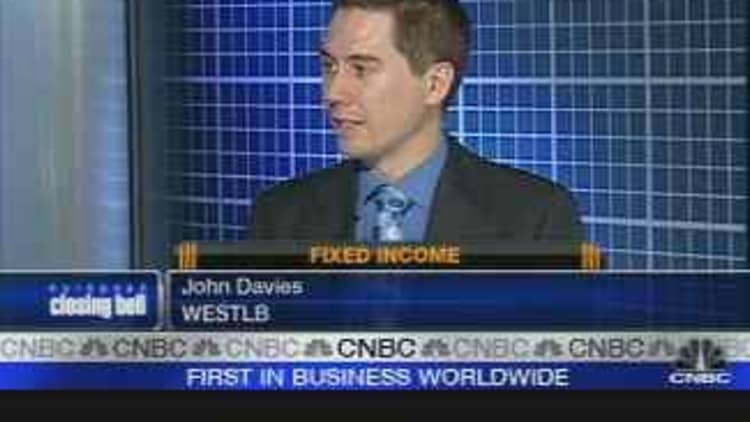U.S. Treasury bonds rallied for the fourth day Thursday as credit concerns along with soft U.S. labor and factory data boosted expectations the Federal Reserve would cut rates soon and made investors more risk averse.
Investors sought the safety of government bonds after disappointing quarterly results from Bank of America underscored the toll that credit market turmoil was continuing to take on financial institutions and pushed stocks lower.

A weaker-than-expected regional manufacturing report added to a strong bid in Treasuries already evident in the previous session, when yields fell by the largest margin in six weeks on dismal housing data.
"It's a continuation of the move that began yesterday," said Michael Cloherty, head of rate strategy at Banc of America Securities in New York. "The market has clearly swung to well in favor of the (rate) cut."
U.S. short-term interest rate futures showed the perceived chance of a 25 basis points rate cut at the Fed's next regularly scheduled policy meeting have risen to about 70 percent, from about 54 percent late Wednesday.
As expectations for a rate cut at the Fed's Oct. 30-31 meeting rose, the two-year note's yield -- which responds closely to expectations for official central bank interest rate moves -- slipped to 3.92 percent with its price up 4/32. It was as low as 3.89 percent earlier in the session.
A bond's yield moves inversely to its price.
Rising expectations for an October rate cut also pushed the yield on the 10-year note down to 4.51 percent. It hit 4.495 percent earlier in the session, which was the lowest since Sept. 19, the day after the Federal Reserve cut interest rates by 50 basis points.
Yields moved lower after the Philadelphia Federal Reserve Bank said its business activity index was at 6.8 in October versus 10.9 in September. Economists polled by Reuters had forecast a reading of 7.3.
The capital expenditures and new orders components of the index declined, while the prices paid index jumped to its highest level since August 2006.
"This is an interesting number. I like to look at six-month capital expenditures: that is a very big issue. There are a lot of hopes it will rebound, but right now there are some causes for concern," said Josh Stiles, bond strategist and managing director at IDEAglobal in New York.
Weekly initial jobless claims were higher than expected, hinting that housing's decline might be starting to take a toll on the labor market. Meanwhile, the Conference Board's index of leading economic indicators rose 0.3 percent in September after falling 0.8 percent in August.

